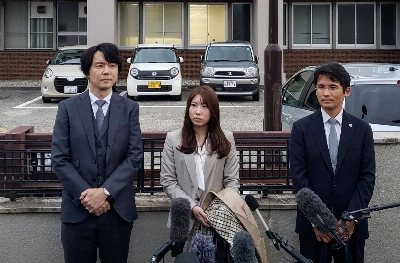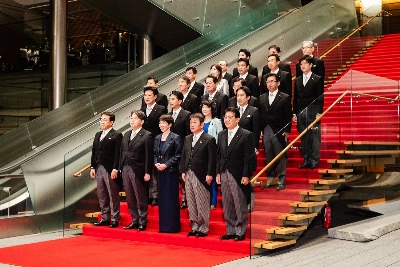Japanese people often wrongly pronounce "l" as "r," or "r" as "l." So, "leader" can be pronounced as "reader."
"Japanese politicians are not leaders, but readers," said Tetsunari Iida, executive director of the Tokyo-based Institute for Sustainable Energy Policies, at a conference on climate change held in Chiba on March 12.
From Iida's viewpoint, Prime Minister Yasuo Fukuda is a reader. At the annual meeting of the World Economic Forum in Davos, Switzerland, in late January, Fukuda proposed a package of policies titled "Cool Earth Promotion Program" to tackle global warming.
"Fukuda's speech at Davos was compiled by officials of the Environment Ministry and the Ministry of Economy, Trade and Industry, after those bureaucrats from opposing ministries had fought over whether to include or omit every word of his speech until the last moment," Iida said. "Fukuda just read the script."
Less humorously, the researcher claimed that those bureaucrats are actually controlling policies on global warming to ensure they are ineffective and insufficient.
Not only Iida, but other researchers for nongovernmental organizations from Japan and overseas also questioned the Japan-led "Cool Earth Promotion Program" at the meeting hosted by Japanese environmental organizations.
The meeting took place right before a conference of environment and energy ministers from the Group of 20 countries held in Chiba from March 14 to 16.
The NGO meeting on March 12 was also attended by Japanese government officials. One of them, Ryutaro Yatsu, councilor on global environment at the environment ministry, explained that the "Cool Earth Promotion Program" states that Japan and other major emitters should set quantified national targets for cuts in their greenhouse gas emissions.
According to the program, the targets should be set based on a bottom-up approach, by compiling the potential energy efficiency of eight sectors, including energy-intensive manufacturers, power generation and transportation.
Transparent and rational
Concerning the proposal, Alden Meyer, Policy Director of the U.S.-based Union of Concerned Scientists, insisted the bottom-up approach should be both transparent and rational.
"But the approach has to add up to science-based targets collectively for the industrialized countries," Mayer said. "And I am worrying how Japan envisions this process working."
Yatsu explained that the International Energy Agency has been researching to create a global standard index of energy efficiency that would be the basis of the sectoral targets.
But Yurika Ayukawa, the climate change program special adviser at the World Wide Fund for Nature Japan (WWF Japan), said that the bottom-up approach would not achieve the large reductions that are urgently needed — adding that the approach increases the risk of global warming greatly exceeding the danger limit of 2 C compared to preindustrialization levels.
"Japan should set its target based on the latest findings of scientists in a top-down approach," Ayukawa said.
As one of some 190 countries at the U.N. Conference on Climate Change in Bali last December, Japan agreed to launch two years of U.N. negotiations for a new global pact to cut emissions. It was an attempt to include such major emitters as the United States and China in a post-Kyoto Protocol framework after it expires in 2012.
Jennifer Morgan, climate and energy director of E3G, a British-based company working for sustainable development, said that the outcome of the Bali meeting was minimum in the sense that it did not decide what level of targets the nations would have.
"But it was also a maximum one. It was most likely and most possible with the current Bush administration at the table," Morgan said — pointing to the next U.N. conference on climate change to be held in Copenhagen in 2009. "But Copenhagen has to be the maximum outcome for all. And it has to push the limits of all countries to come to a common agreement that is based on fairness and ambition."
Morgan also said she hopes Japan moves forward with a national cap-and- trade system. Under such a system, introduced in the European Union in 2005, companies are obliged to set emissions-cut targets and are able to trade emission credits to achieve their goals.
Yatsu of the environment ministry said that in the last few weeks the Japanese government has started discussions on the introduction of a cap-and-trade system.
In past years, the ministry has insisted the system is effective in cutting Japan's increasing emissions. But the ministry has faced strong opposition from industries and the trade ministry, who have claimed the system undermines the international competitiveness of Japanese businesses.
Surprise and expectation
"The government is now trying to understand the merits and demerits of a cap-and-trade system for Japan," Yatsu said. "I received the recent move with surprise and expectation. Now I am making the utmost effort to put forward this system."
In the United States, meanwhile, six states in the Midwest are working to establish a regional cap-and-trade system, Meyer of the Union of Concerned Scientists said — adding that the country has recently been proceeding with measures for curbing emissions at the federal, state and business levels.
Meyer said that the U.S. presidential candidates Sen. Hillary Clinton, Sen. Barack Obama and Sen. John McCain all support setting greenhouse gas emissions caps. Clinton and Obama have put forward detailed climate and energy plans, Meyer said.
"The good news is that all three are arguing they can be the best in providing international leadership on global warming. That's a big change from President George W. Bush," he said.
While the U.S. and Japan seem to be starting to tackle global warming in a more serious manner than before, Iida of the Institute for Sustainable Energy Policies criticized Japan's policies on the promotion of renewable energy as ineffective.
"The government is targeting a 1.63 percent growth in the share of renewable-energy electricity in 2014. But this percentage is like a joke," Iida claimed, explaining that actual power generation by renewable energy has already topped the government targets in the last few years.
Iida explained the government, greatly influenced by big energy industries, hammered out the targets — targets which have actually been preventing the promotion of renewable energy.
In Germany, the government is striving to increase the share of renewable-energy electricity to 45 percent by 2030, the researcher said, adding that Japan has also the potential to hike its percentage to 67 by 2050.
However, when Kazuhiko Honbu, deputy director general for energy and environmental policy at the trade ministry, was asked to comment on Iida's harsh criticism, he would only say: "I learned a lot from the presentation."
It was unfortunate that the official did not give any counterargument. But Japanese officials and ministers should get ready to face a wide range of arguments on global warming as the nation hosts the Group of Eight Summit in Hokkaido in July — with its major theme being climate change.
"We all hope that Japan will emerge into a leader, not a reader, on climate-change politics," Morgan of E3G said.


















With your current subscription plan you can comment on stories. However, before writing your first comment, please create a display name in the Profile section of your subscriber account page.